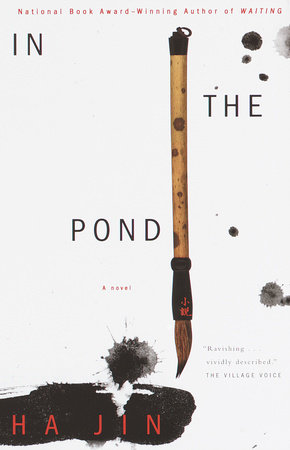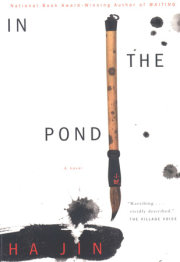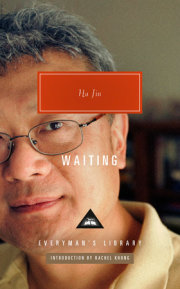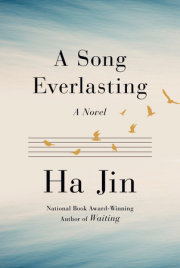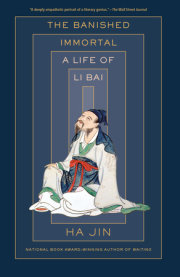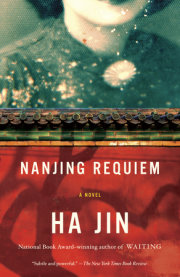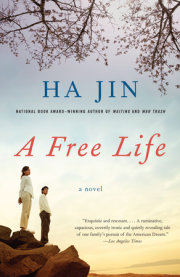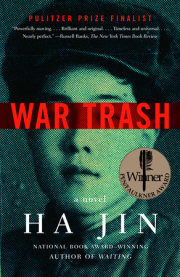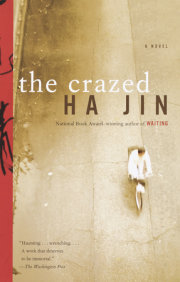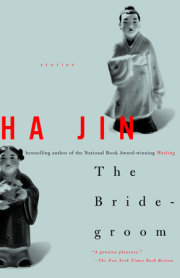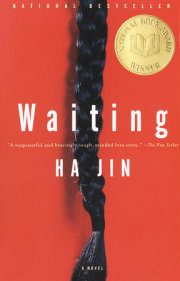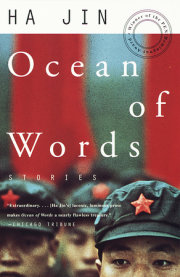One
SHAO BIN FELT SICK of Dismount Fort, a commune town where he had lived for over six years. His wife, Meilan, complained that she had to walk two miles to wash clothes on weekends. She couldn't pedal, so Bin was supposed to take her on the carrier of his bicycle to the Blue Brook. But this month he worked weekends in the Harvest Fertilizer Plant and couldn't help her. If only they had lived in Workers' Park, the plant's apartment compound, which was just hundreds of paces away from the waterside. These days Meilan prayed to Buddha at night, begging him to help her family get an apartment in the park soon.
"Don't worry. We'll have one this time," Bin told her Wednesday afternoon.
"How can you be so sure?"
"They should give us one. I have more seniority than others."
"That can't be a guarantee."
Indeed he had worked in the plant for six years. According to the principle of need and seniority, this time it seemed the Shaos should have a new apartment, but Meilan was not optimistic. "You know," she said, "if I were you I'd give Secretary Liu and Director Ma two bottles of Grain Sap each. I heard that lots of people have visited them in the evenings. You shouldn't just sit and wait."
"Forget it. I won't spend any money on them."
"Stubborn ass," she said under her breath.
Bin was a small man. He used to be healthy and stout, but in recent years he had lost so much weight that people called him Skeleton behind his back. Despite his physique, he was both talented and arrogant. He was better read than others in the plant, and he knew a lot of ancient stories, even the adventures of Sherlock Holmes. What is more, his handwriting was handsome. That was why some women workers used to say to one another, "If only the man was as good looking as his handwriting." When he was engaged to Meilan five years before, people had been amazed and remarked, "A beauty loves a scholar indeed." Although Meilan was not beautiful and Bin was not a true scholar, compared with him she was a better match, having several suitors.
Since they were married, they had lived in one room in a dormitory house on Old Folk Road, owned by Meilan's work unit, the People's Department Store. They now had a lively two-year-old, for whom alone the room, twelve feet by twenty, was hardly enough. Besides, Bin was an amateur painter and calligrapher, though officially he was a fitter. As an artist, he needed space, ideally a room for himself, where he could cultivate and practice his art, but that had been impossible. Every night he stayed up late, wielding a writing brush with the table lamp on, which disturbed his wife's and baby's sleep. And the room was always saturated with an inky smell. Often Meilan had to open the windows in the cold winter, yet Bin had no other way to do brushwork. How the Shaos were longing for decent housing.
These days Bin had been trying in vain to find out whether or not his name was on the list being considered by the Housing Committee. Most of his fellow workers grew reticent and mysterious, as though all of a sudden everybody had struck gold; they became mean to others.
Now it's my turn to have an apartment, Bin repeated to himself on Thursday morning, when he was repairing a hydraulic jack for the Transport Team. The night before, Meilan's words about the workers' bribing the leaders had sown some fear in him; yet he kept reminding himself not to lose heart.
Sooner than he expected, in the afternoon the final list was posted on the notice board at the plant's front entrance. Bin went there but didn't find his name among the lucky ones. He was outraged; so were many others. In all the workshops angry voices were rising while those who had been assigned apartments turned silent at once. Some workers said they would put out big-character posters without delay, to expose the leaders' corruption. A few declared they were going to demolish the four larger apartments built for the leaders, blowing them up with packages of TNT at night. But this was merely bluff; the same thing had been said many times before, and nothing of the sort had ever taken place here.
As soon as the electric bell announced the end of the shift, Bin left the plant. He was cycling home absently, an army cap askew on his head and his white shirt unbuttoned, its tail flapping gently behind him. His mind was full. How should he break the bad news to Meilan? She would be so disappointed. How could he console her?
The moment he passed the railroad crossing near the northern end of the plant, he saw the Party secretary, Liu Shu, walking ahead with his hands clasped behind. Bin caught up with him and got off his bicycle. "May I have a word with you, Secretary Liu?" he said.
"All right." Liu stopped and straightened up a little, his hooded eyes half closed.
"Why didn't I get housing this time?" Bin asked.
"You're not alone. Over a hundred comrades are still in line. Don't you know that?"
"I've worked in our plant for six years. Hou Nina has been here for only three years, but she got an apartment this time. Why? I cannot understand this."
Liu told him bluntly, "That's a decision made by the Housing Committee. They believe she needs it more than you. Women and men are equal in our new society. You have a place to live now, but she has stayed with her folks in the village all these years. She needs her own place to get married. Her wedding has been put off twice; she can't remain single forever."
Bin wanted to yell: She can live with you, can't she? But he didn't say a word; instead, he turned and hopped on his National Defense bicycle, riding away without saying good-bye to the secretary. He couldn't help cursing Liu to himself, "Son of a tortoise, you've had a good apartment already, but you took a larger one this time. You've abused your power. This is unfair, unfair!"
The stocky secretary shook his head and said to Bin's back, "Idiot!"
Bin planned to break the bad news to his wife after dinner, but seeing his dark face, Meilan sensed that something was wrong and asked him several times what it was. He went ahead and told her; he even mentioned that Hou Nina, the junior accountant, had received a new apartment. At this, tears came to Meilan's eyes, and she cursed the leaders loudly. She also blamed Bin for his stubbornness, saying, "A few bottles of liquor are a small cost. How many times did I tell you? But you wouldn't listen."
"Come and eat," he said, picked up a pair of chopsticks, and lifted a bowl of noodles to his mouth, slurping the soup. Then with a spoon he put some minced toon leaves into his bowl.
"I don't want to eat, I'm full of gas." She turned and pushed the window open. Outside, a breeze passed by and shook a few raindrops off the aspen leaves, pattering through the trees. A frog was croaking hesitantly.
"What are you going to do?" she asked.
"I don't know. What do you think?"
"They've maltreated us. You should report those corrupt men."
Bin didn't answer and went on eating. Shanshan, their baby daughter, was stirring her bowl of custard with a green plastic spoon, waiting for her mother to feed her. A short noodle was lying on her white bib, near the red bill of an embroidered dove.
Meilan, in a sky blue dress, remained at the window, her shapely chest bulging a little as she was still fuming. She raised her hand and put a strand of hair back behind her small ear; she leaned over the sill and spat out the window. Once in a while she wiped the tears off her cheeks with her thumb and forefinger.
After dinner Bin was sitting outside the dormitory house, smoking and waving a fan on which spread a misty landscape-a temple, a river, and two slender boats, each punted by a tiny fisherman in a straw hat. His Adam's apple moved up and down while his lean face looked tense. He was deep in thought; his small eyes narrowed as the bushy brows joined. Above his head flared a 25-watt lightbulb, around which a puff of gnats were flitting, a few mosquitoes buzzing among them. The air smelled of rotten fish and fresh corn. Beyond the high wall two trucks were tooting their horns on the street, as if quarreling.
In the middle of the courtyard, Meilan was washing bowls and dishes with an angry clatter at the faucet. Bin understood that this time he had been in the wrong. A wise man should do everything to preempt bad odds, as Meilan had told him, but he had been impervious to reason and let the bad odds multiply. Unlike his plant, the department store had only sixteen employees; it was unable to build an apartment house on its own. So his family depended on him to get decent housing, but he had blown the opportunity. Who could tell in what year a new apartment would be available again? Heaven knew how long his family would have to live in this single room.
Choking with anger, he was determined to do something about the injustice. Even though he couldn't correct the leaders' wrongdoing, he wanted to teach them an unforgettable lesson and show them that he wouldn't swallow an offense. But what should he do?
He remembered that the materialist thinker Wang Chong of the Han Dynasty had said something about punishing the evil with the writing brush. He couldn't recall the exact words. That passage must have been in the paperback The Essence of Ancient Chinese Thought, which he had read a few weeks before. He stood up and went back into the room. On the top of a wicker bookshelf, the book was sandwiched between an epigraphic dictionary and an album of flower paintings. He pulled it out and without difficulty found the passage, since he had folded the bottom corner of the page as a bookmark. He perused Wang Chong's words:
How can writing be merely playing with ink and toying with brush? It must record people's deeds and bequeath their names to posterity. The virtuous hope to have their deeds remembered and therefore exert themselves to do more good; the wicked fear having their doings recorded and therefore make efforts to restrain themselves. In brief, the true scholar's brush must encourage good and warn against evil.
Bin closed the book, profoundly moved. Writing and painting belong to the same family of arts, he reasoned; they are both the work of the brush. Yes, to fight the evil is the essential function of fine arts. As an artist and scholar I ought to expose those corrupt leaders. Whatever they are, painting and writing must not be embroidery and decoration; they must have strength and a soul-a healthy, upright spirit. A good piece of work should be as lethal as a dagger to evildoers.
After Meilan and Shanshan went to bed, Bin began grinding an ink stick in his antique ink slab, which was in the shape of a crab, carved out of a Gold Star stone. His hand kept moving clockwise in tiny circles. The ink was ready in a few minutes; he picked up a brush made of weasel's hair and began to draw a cartoon. On a large sheet of paper he drew a huge official seal, standing upside down. Then on the seal's bulky handle he sketched an ecstatic face with a few hairs on the crown. Up on the seal's flat top, which was in the form of an oval stage, he put a dozen midget men and women sitting together in two rows. He made sure that two of them in the center resembled Secretary Liu and Director Ma. Liu, wearing a handlebar mustache, sat with his short arms crossed before his chest, while Ma's long face was pulled downward as though his mouth was filled with food. Behind the human figures Bin set up a six-story building with broad balconies and tall windows, from which fluorescent rays were darting out.
The drawing finished, Bin dipped a smaller brush in the ink, then wrote a line of bold characters at the top of the paper as the title: "Happy Is the Family with Power."
The excitement of creating a meaningful piece of work kept him awake after he went to bed. He forced himself to count his heartbeats, which were faster than the second hand of the clock on the wall. His temples were tight, and his head wouldn't cool down; within two hours he got up three times to urinate in the outhouse in the west corner of the courtyard. Not until two o'clock did he go to sleep.
The next morning he showed the cartoon to his wife. "Good, good," she said. "I hope this will be a land mine and blast them."
Carefully he stuffed it into a manila envelope addressed to the L?da Daily, a regional newspaper in which he had published three words of calligraphy. On his way to work, he went up Bank Street and dropped the envelope into the mailbox in front of the post office.
Two
FOR DAYS the whole plant was talking about the housing assignments. The leaders had anticipated the discontent and were not worried. Only two big-character posters, fewer than they had expected, appeared in the plant; both were pasted on the side wall of the office building. One was entitled "Workers' Park Is Not for the Workers to Inhabit"; the other, "What Makes the Housing Principle Flexible?"
Though the two posters touched on bribery and the privileges the leaders had granted themselves, Secretary Liu and Director Ma were not daunted by this sort of writing. What they feared was that some workers might put out posters at the Commune Administration, appealing to their superiors to interfere with the plant's housing, but so far nothing of that kind had happened. In fact, the workers' bitter voices were dwindling.
The mollification was mainly the result of four buckets of human excrement that had been secretly dumped into the larger apartments, one bucket in each. For two days the unused rooms stank and teemed with flies and maggots; some of the walls were soiled.
It was a simpleminded trick, far from reaching the effect the rumor claimed: the leaders would no longer want the stinking apartments. On the contrary, they still meant to move in, though it was true that Liu and Ma had been outraged and almost called an emergency meeting after seeing the mess. But both of them were seasoned cadres and hadn't acted rashly.
Copyright © 2000 by Ha Jin. All rights reserved. No part of this excerpt may be reproduced or reprinted without permission in writing from the publisher.

